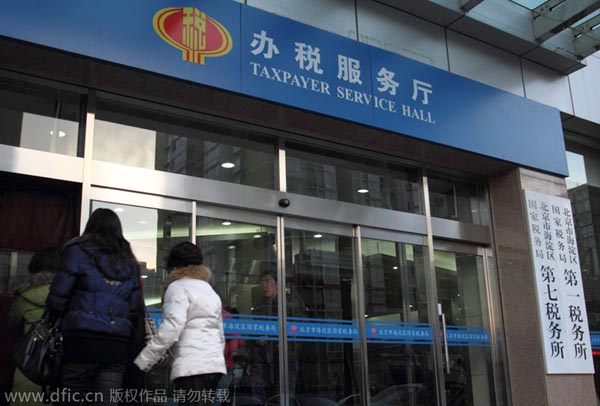More tax reduction policies in the pipeline


Finance ministry seeks to cut costs of corporates, stimulate market vitality
Further detailed tax reduction policies will be issued soon to support employment and strengthen economic growth momentum, ensuring the annual goal of reducing more than 1.3 trillion yuan ($187 billion) in taxes and fees for both corporates and households, the Ministry of Finance said on Thursday.
The ministry plans to issue specific guidance to improve policies for export tax rebates. In addition, details of special expense deductions for individual income tax are being studied, said Yuan Haiyao, deputy head of the ministry's Department of Tax and Policy.
"We are studying further cuts to taxation and the greater reduction of administrative fees, to lower corporates' costs and stimulate market vitality," he said.
During the national tax cut campaign, the Chinese government's fiscal revenue growth decelerated to 2 percent in September, the slowest pace this year, in a move to ease the burden on corporates and offset external headwinds, according to data issued by the ministry on Thursday.
Last month, fiscal revenue reached 1.3 trillion yuan, compared with 1.1 trillion yuan in August. But the year-on-year growth rate slipped by 2 percentage points within a month, the ministry reported at a news conference.
The expansion of tax income also retreated to the year's slowest pace in September, down to 6 percent from 6.7 percent in August, as the previously issued tax reduction policies, especially for value-added taxes, have started to take effect.
The Chinese economy has seen some changes recently based on stable foundations, in the face of some new issues and challenges, along with notable changes in the external environment, according to ministry official Yuan.
Under the circumstances, "many market players are expecting further and stronger measures to reduce taxes and administrative fees", he added.
In terms of fiscal expenditure, it increased by 11.7 percent year-on-year in September to 2.26 trillion yuan, compared with a growth rate of 3.3 percent in August. The total fiscal spending during the first three quarters accounted for 77.8 percent of the annual budget, according to the ministry.
Faster growth in government expenditure is a "counter-cyclical factor" to ensure economic stability, acting as a cushion to offset downside risks, said Ming Ming, an analyst with CITIC Securities.
"Fiscal policy may not be constrained by the pressure of fiscal balance or the standard of fiscal deficit, which means bond issuance is necessary when it is required (by the economic situation)," said Ming.
During the first three quarters, local governments issued 1.25 trillion yuan of special-purpose bonds to support infrastructure construction, accounting for 92.4 percent of the annual quota. Outstanding local government debt increased to 18.26 trillion yuan by the end of September, said the ministry.



































